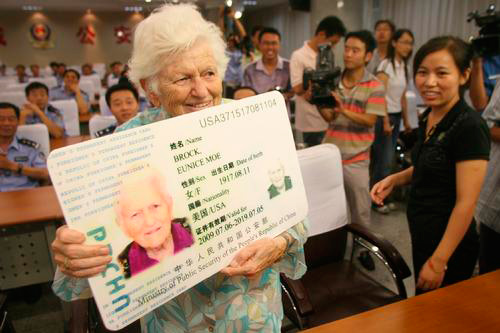中国简化海外高级人才“绿卡”
China is making it easier for so-called "top talents" from abroad to get permanent residency. Right now just thousands of foreigners hold permanent residency status in China. But it may take more than easier green cards to attract rare talent.
In a recent interview with the China Daily, the head of China’s State Administration of Foreign Experts, Zhang Jianguo, said China wants to speed up and simplify permanent residency procedures for so-called "foreign talents." These include scientists, PhD holders and senior managers. Along with those investing at least 500,000 US dollars in the country. The government wants to make it easier for them to stay. But over the last decade, just 6,000 expats gained permanent residency in China.

China is making it easier for so-called "top talents" from abroad
to get permanent residency.
"The regulations are a factor, but also the lottery car system and high housing prices. There are also some talents who are Chinese and educated in Western countries - but these factors I just mentioned are also preventing them from coming back." said Professor Zhu Guozhong, Applied Economics Dept., Peking Univ.
Last year, China added a new visa category - R - to cover those with skills urgently needed in China. The Administration says it now plans to let more R visa holders gain permanent residency. In recent years, China also expanded its social security system to cover foreigners - allowing them the same retirement, unemployment, medical and maternity benefits as Chinese citizens.
Despite the many measures China is taking to attract experienced foreigners for the long term, smog like this is keeping many away. The government is trying to fix it. The capital alone plans to invest a trillion yuan, or 160 billion US dollars, to fight air pollution. But it could take some time for the skies to truly clear.
According to the American Chamber of Commerce last week, almost half (48%) of its more than three hundred members said poor air quality was making it harder to recruit senior executives to China... Up from around a third (34%) last year.
Environmental protection is a key industry China hopes to attract foreign specialists to. Such as Alessandro Celestino, who has 10 years’ experience in renewable energy and the environment, but he says, family concerns are holding him back from staying long-term.
"I had my first son last year. We decided to move back to Europe to give him an education closer to our culture... The environmental issue is also very, very important.” said Alessandro Celestino, Project Supervisor, Sino-Italian Environmental Protection Program.
As China pursues more service-led growth, attracting top talent remains an uphill battle.